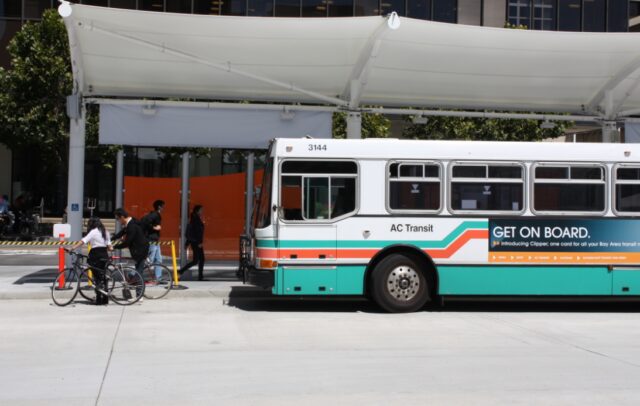
OAKLAND — Despite passionate pleas from the riding public, AC Transit’s Board of Directors voted unanimously last month to implement another round of deep cuts to bus service in the East Bay, citing declining revenues and a growing budget deficit projected to soar to $41 million over the next two fiscal years.
The round of cuts approved by the board would go into effect in December 2010, two months after another series of bus service cancellations are scheduled to take effect on October 31.
The cutbacks would bring the level of public transit service in the East Bay to their lowest levels in the history of the agency’s 50 year history, public transit advocates warned.
On October 31, a 7.2 percent service reduction will go into effect on 70 AC Transit bus lines. Wait times between buses on many lines, including the LA-Richmond Parkway Transbay Express, 51A/51B Broadway-College-University, and the 52-University will increase.
Many routes will see service begin later and end earlier in the day. Route changes will also go into effect on other lines as well. The changes affect nearly every bus line from Richmond through Fremont in AC Transit’s service area. A complete list of the October 31 cuts can be found here.
In December, another round of cuts will be implemented to eliminate weekend bus service on all but 21 bus lines and cancel service on four of the six all-nighter “owl” service routes providing service between midnight and early morning.
Saturday and Sunday service will only operate on lines 1, 1R, 18, 20, 22, 26, 40, 45, 51A, 51B, 57, 60, 72, 72M, 73, 76, 88, 97, 99, 210 and 217.
Weekend service on 7, 11, 12, 14, 21, 25, 31, 32, 49, 52, 54, 62, 65, 67, 68, 70, 71, 74, 85, 86, 89, 93, 95, 98, 242, 251, 275, 332, 345, 350, 376, 386, F, NL and O are slated to be eliminated. Preliminary information on the December cuts can be found here.
The cuts, approved on Wednesday by the AC Transit board, would reduce weekend service to major corridors and lines with busier ridership. Community service routes, especially routes travelling through Alameda and Contra Costa County suburbs, would be eliminated entirely.
Transbay bus service to San Francisco will also be eliminated, according to the service reduction plan.
The board also voted to discontinue service on lines 802, 805, 840 and 851, “all-nighter” service routes criss-crossing major corridors throughout the service area. Only two lines, the 800 (which provides early morning service from San Francisco when BART is not operating) and the 801 would continue to operate.
During an emotional three-hour Board meeting at District headquarters in Downtown Oakland in September, bus drivers, passengers and members of the Amalgamated Transit Union Local 192, which is locked in a bitter labor dispute with the agency, lamented what another round of proposed cuts would do the transit-dependent residents of the East Bay.
“I think somebody might need to open a car dealer around here soon,” said Nicholas Adams, a former AC Transit Paratransit employee and bus rider. “You’re cutting your transit to the bone. There’s nothing left but to buy a car.”
Passengers, bus drivers and union representatives said the cuts would doom the fiscally ailing transit agency even further. By year’s end, the agency would have eliminated 20 percent of bus service since January 2010, the agency estimates.
“Right now, this agency is like a patient in critical condition,” AC Transit Interim General Manager Mary King said in a written statement this week. “AC Transit must act to stop the hemorrhaging now.”
The cuts would allow the agency to save $11 million annually, King said, and would force the layoff of 60 current AC Transit bus operators.
“We are applying tourniquets wherever possible in order to remain solvent and sustain some level of service for seniors, youth, disabled, working people and other riders who depend on AC Transit during these undeniably difficult economic times,” she said. “Once we have stabilized the agency we will look for ways to restore service when funding to do so is available.”
AC Transit, like many transit agencies, is grappling with significantly decreased funding triggered by the economic recession, the district said. No indication was given during the Board of Director’s meeting that the December cuts would spell the end of service cuts for the district.









